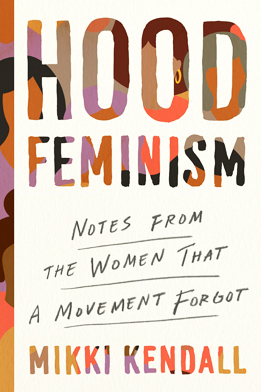|
Hood Feminism:
Notes from the Women That a Movement Forgot
by Mikki Kendall
c.2020, Viking
$26.00 / $35.00 Canada
267 pages
By Terri Schlichenmeyer
The Truth Contributor
A sea of people.
That's what you saw,
overlooking the crowd at the rally you attended. More
people, perhaps, than you'd ever seen in one place before,
all gathered together for one ultimate cause. Or were they?
In the new book Hood Feminism by Mikki Kendall,
look again: was that sea of people mostly white?
Chances are, says Kendall,
if it was a women's event, many were. White feminists "can
lean in," but they sometimes don't "show up when black
women" have different issues to deal with. Feminism, she
says, can't "forget that a movement that claims to be for
all women" must "engage with the obstacles women who are not
white face." |
 |
|
"And when we act as
allies," she says, "feminists have to be willing to listen
to and respect those we want to help."
That includes
understanding that guns have a lot to do with feminism
because poor women and women of color are "more likely to be
victims of gun violence." It includes knowing that hunger
and homelessness are painful realities for many black women,
and that it doesn't help to make either seem like they were
the result of "bad choices."
Respect means that victims
of abuse and sexual harassment are not blamed for their
clothing, job, or hairstyle. It means never asking what they
were drinking when they were assaulted. It means the end of
hypersexualizing young black girls and women. It means
accepting their unique beauty, without politicizing hair or
body shape, and without comment. This also, by the way,
extends to trans women of any color.
Feminism for all means
that we ignore fear and misconceptions of "the hood." It
means that we must "unteach the normalization of violence
against women." It demands that we confront family and
friends who hold racist ideals. It means supporting health
measures for women and their children. It means voting for
the good of all women, and it requires that allies
occasionally "stop, step back, and realize they are still
part of the problem."
In tackling Hood
Feminism, there may come a time when a reader finds it
necessary to split the narrative.
On one hand, author Mikki
Kendall offers exactly what she promises: an uncomfortable
truth, because it's necessary and because she's kind, and
laying out this information is a sort of kindness. The
things she points out are vital for people who profess to be
"feminists" to know, and while that may not be any fun,
neither is ignorance. Fingers out of your ears, think of
this book, maybe, as consciousness-raising workshop plus
personal intervention.
On the other hand,
however, Kendall paints white women with a mile-wide,
10-feet-tall brush of condemnation, that may or may not be
fair. Yes, these are words that white women need to hear...
and yes, they're also somewhat overgeneralized.
Still, keep in mind that
this is a book to help, not to censure, and even
though it stings, you'll be glad you read it. Find Hood
Feminism. It offers an ocean of thoughts to ponder.
|